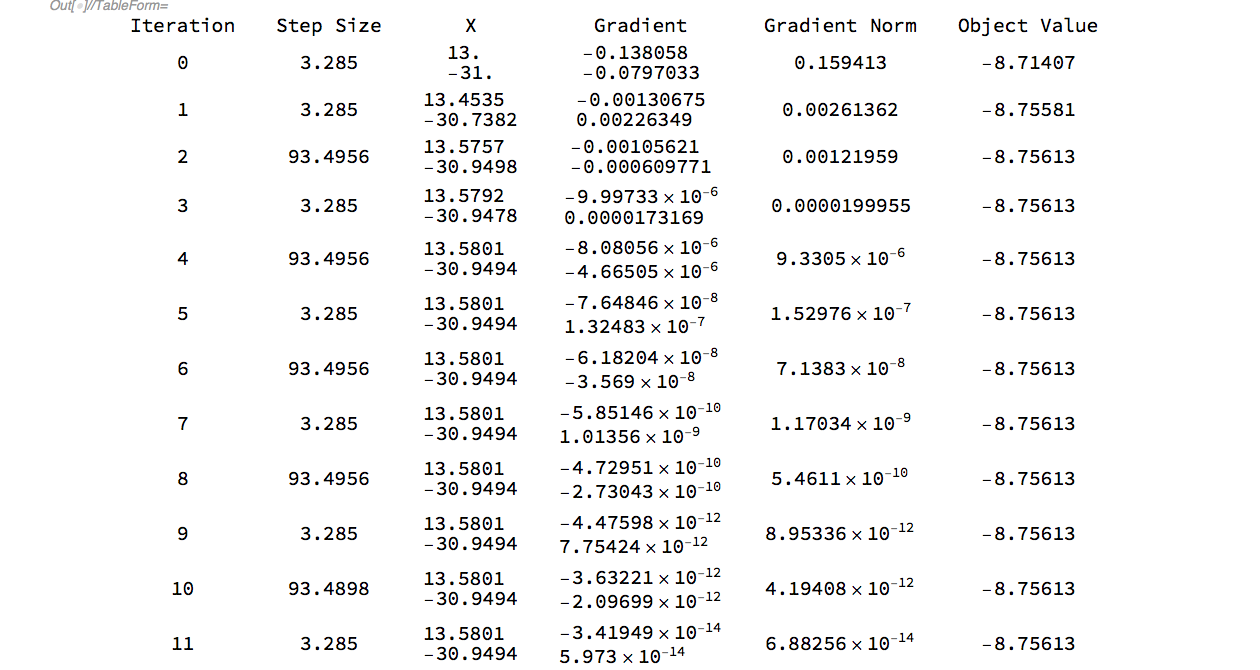Here's a slight refactoring of the OP's solution.
Expressions like #[[5]] are hard to read and therefore hard to debug. One can use a function with symbolic names for arguments to make the easier to understand.
I think it's better to return raw output data of a function and leave it formatting etc. to processing the returned data. So I moved TableForm outside the function gmQuadraticF.
gmQuadraticF[A_, b_, x0_, eps_, iter_] := Module[{g, NormG, f, test},
f[{step_, α_, x_, g_, squareNormG_, v_}] :=
With[{stepfactor = Norm[g]^2/g.A.g},
With[{ng = stepfactor*g},
With[{xnext = x - ng},
With[{grad = A.xnext + b},
{step + 1, (*update Iteration counts*)
stepfactor, (*α step size*)
xnext, (*update x*)
grad, (*update gradient*)
Norm[grad], (*update gradient norm*)
1/2 xnext.A.xnext + b.xnext (*object function value*)}
]]]];
test[{step_, α_, x_, g_, squareNormG_, v_}] :=
step <= iter && squareNormG >= eps;
g = A.x0 + b;
NormG = Norm[g];
NestWhileList[
f,
{0, (* initial step number *)
(NormG^2)/g.A.g, (*α step size*)
x0, (*initial x*)
g, (*intial gradient*)
NormG, (*intial gradient norm*)
1/2 x0.A.x0 + b.x0}, (*object function value*)
test]
];
gmQuadraticF[TableHeadings] = {"Iteration", "Step Size", "X",
"Gradient", "Gradient Norm", "Object Value"};
Example:
SeedRandom[0];
dim = 2;
aa = RandomReal[{-1, 1}, {dim, dim}];
aa = aa\[Transpose].aa;
bb = RandomReal[1, dim];
x0 = Developer`ToPackedArray@{13., -31.};
eps = 1.*^-12;
TableForm[
gmQuadraticF[aa, bb, x0, eps, 200],
TableHeadings -> {None, gmQuadraticF[TableHeadings]}
]

Here's a Mathematica-like version with precision control:
ClearAll[gmQuadraticF, igmQuadraticF];
Options@gmQuadraticF = {WorkingPrecision -> Automatic};
gmQuadraticF[A_, b_, x0_, eps_, iter_Integer, OptionsPattern[]] :=
Module[{wp},
wp = OptionValue[WorkingPrecision];
wp = wp /.
Automatic -> (Precision[{A, b, x0}] /.
Infinity -> MachinePrecision);
Block[{$MaxPrecision = wp, $MinPrecision = wp},
igmQuadraticF[
SetPrecision[A, wp],
SetPrecision[b, wp],
SetPrecision[x0, wp],
eps, iter]
]
];
igmQuadraticF[A_, b_, x0_, eps_, iter_] :=
Module[{g, NormG, f, test, stepfactor, ng, xnext, grad},
f[{step_, α_, x_, g_, sqaureNormG_, v_}] := (
stepfactor = Norm[g]^2/g.A.g;
ng = stepfactor*g;
xnext = x - ng;
grad = A.xnext + b;
{step + 1, (*update Iteration counts*)
stepfactor, (*α step size*)
xnext, (*update x*)
grad, (*update gradient*)
Norm[grad], (*update gradient norm*)
1/2 xnext.A.xnext + b.xnext (*object function value*)});
test[{step_, α_, x_, g_, squareNormG_, v_}] :=
step <= iter && squareNormG >= eps;
g = A.x0 + b;
NormG = Norm[g];
NestWhileList[
f,
{0, (* initial step number *)
(NormG^2)/g.A.g, (*α step size*)
x0, (*initial x*)
g, (*intial gradient*)
NormG, (*intial gradient norm*)
1/2 x0.A.x0 + b.x0}, (*object function value*)
test]
];
